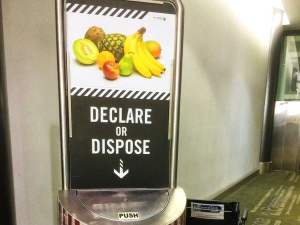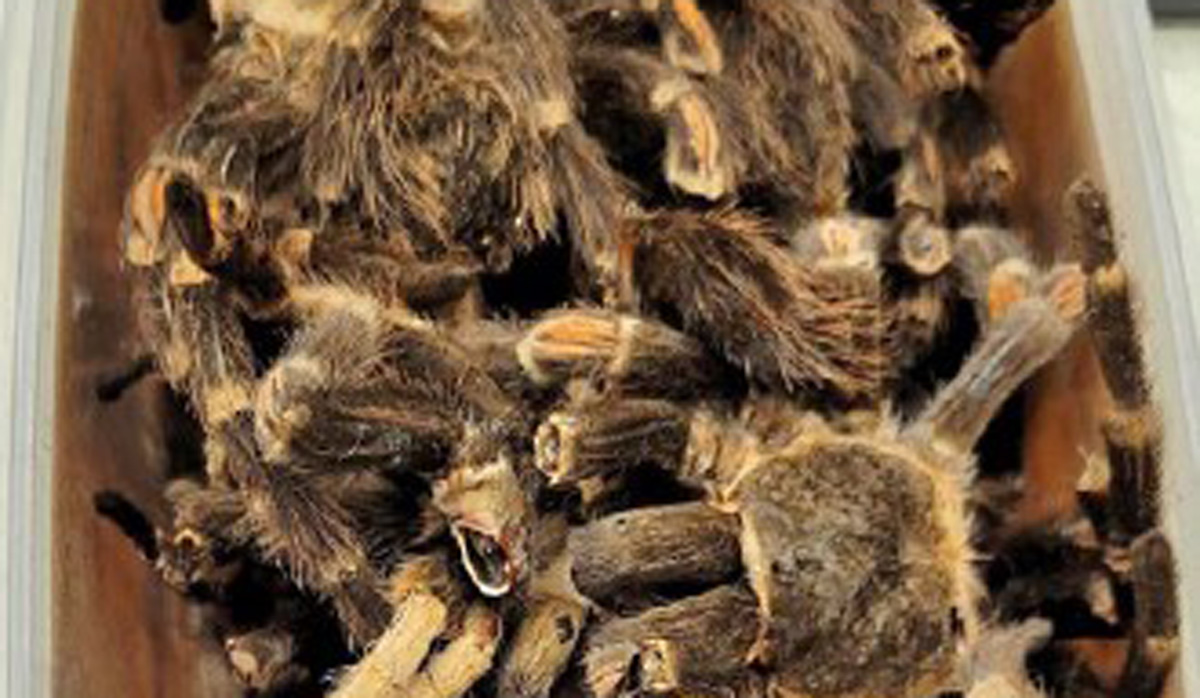NZ winegrowers advance vineyard biosecurity in 2025
The year was marked by “progress, collaboration and reflection” in biosecurity, says New Zealand Winegrowers Biosecurity Advisor Jim Herdman.
 Biosecurity New Zealand officers have been experiencing high volumes of arriving travelers, particularly at Auckland Airport.
Biosecurity New Zealand officers have been experiencing high volumes of arriving travelers, particularly at Auckland Airport.
A container of dead tarantulas and 28 mangoes are among the items found by Biosecurity New Zealand quarantine officers at the border as passenger arrivals climb.
In June, a total of 406,061 passengers arrived in New Zealand, compared with 206,394 passengers in June 2022, says Mike Inglis, northern regional commissioner, Biosecurity New Zealand.
“The passenger volume increase has led to a rise in the number of seizures of goods that could carry unwanted pests or diseases,” says Inglis. “In June, our border officers seized 9061 items from arriving passengers, compared with 2693 items in June 2022.”
“A recent seizure saw our staff destroy 28 fresh mangoes declared by a passenger arriving at Auckland Airport from India. The mangoes were inspected for fruit flies before destruction.”
He says Biosecurity New Zealand officers have also been working across other entry points into New Zealand to prevent unwanted pests and diseases from getting through.
“One of the more interesting recent interceptions was a container of dead tarantulas in a parcel arriving from Mexico,” says Inglis.
He says Biosecurity New Zealand continues to improve passenger flows at international airports experiencing high volumes of arriving travellers, particularly Auckland Airport.
“A system-wide approach has been adopted to manage border arrivals. This has involved working closely with Auckland Airport, other border agencies, baggage handlers, and airlines to identify and resolve congestion-related issues,” Inglis says.
“In particular, we did a significant amount of work in preparation for the expected surge in travellers during the July school holidays and the FIFA Women's World Cup. It is pleasing to report the arrivals for the football were completed successfully.
“We have had very positive feedback about the recent introduction of dedicated biosecurity lanes for New Zealand and Australian passport holders, which offer the potential for quicker processing.”
 |
|---|
|
Dead tarantulas found by Biosecurity New Zealand quarantine officers. |
Inglis says Biosecurity New Zealand continues to recruit and expand its workforce as international passenger volumes increase.
In April, 13 new officers graduated from their training. A cohort of 19 new trainee officers started in June and will graduate in mid-August. Six new recruits have also started their training in Wellington and Christchurch. Biosecurity New Zealand has also begun advertising for new trainee officers to start in August and September.
“The recruitment demonstrates our commitment to protecting New Zealand’s primary industries and natural environment and to ensuring goods and passengers undergo biosecurity clearance as quickly as possible,” Inglis says.
“The new officers will join a team that has a reputation for biosecurity excellence and is continually improving our border operations.
“The New Zealand Biosecurity Institute is using its annual Biosecurity Week, which is being marked this week, to celebrate people working to protect the country from invasive pests and diseases.
“Biosecurity Week is an opportunity to highlight that our people are our most important biosecurity tool.”
Biosecurity New Zealand reminds all travellers to declare any risk good they are bringing into New Zealand. This includes food, plants, wooden products, outdoor equipment, and animal products. Failure to declare such items could result in a fine or prosecution.
Tickets are now available for Beef + Lamb New Zealand’s (B+LNZ) Out the Gate, returning from 19-21 May 2026 at Te Pae, Christchurch.
Dairy Women's Network (DWN) is welcoming AgriHealth as a new partner.
Northland Field Days patron Ross Newlove remembers the inaugural field days he attended 40 years ago.
Southland farmer Murray Donald has been appointed as chair of Safer Farms, the industry-led organisation focused on reducing harm, injuries and fatalities in the agricultural sector.
National Lamb Day returns this Sunday, 15 February, with Beef + Lamb New Zealand Inc calling on Kiwis to fire up their barbecues and celebrate the people and the product that put New Zealand on the world map.
When it comes to arranging the sound system at Northland Field Days, no one does it better than Colin Finlayson.

OPINION: Here w go: the election date is set for November 7 and the politicians are out of the gate…
OPINION: ECan data was released a few days ago showing Canterbury farmers have made “giant strides on environmental performance”.